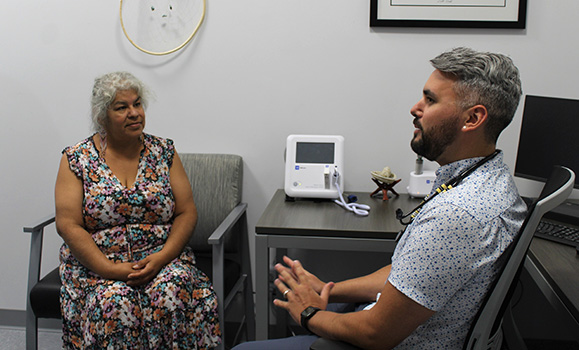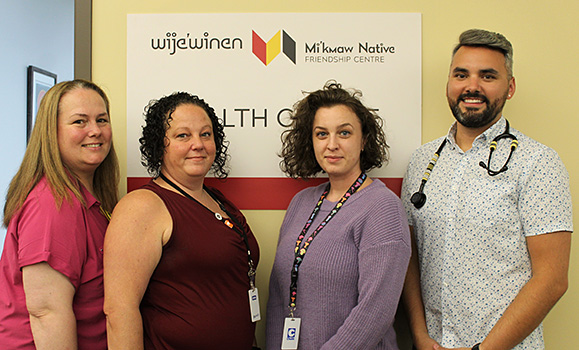On July 8, 2022, the Wije'winen Health Centre opened its doors to the urban Indigenous community in Halifax, providing future opportunities for medical learners interested in Indigenous health.
An initiative of the Mi'kmaw Native Friendship Centre, the new health centre will boast a full-time academic physician position, becoming the first of its kind in Nova Scotia to host learners formally. Medical students and residents will be offered a comprehensive experience in Indigenous health — something that has not previously existed in the central zone.
Serving patients who have not had options for self-directed care in the past, the centre will serve as a space for urban Indigenous peoples to seek culturally safe primary care. At a time when there are acute doctor shortages, the centre’s opening could not be more timely.
Dr. Brent Young is an Anishinaabe family doctor, the academic director of Indigenous health in �鶹��ý’s Faculty of Medicine, and the clinical lead at Wije'winen Health Centre. Dr. Young explains that trauma-informed care is one strategy for providing a culturally safe environment for Indigenous peoples.

Dr. Brent Young speaks with patient Charlotte Bernard
Dr. Young expects that one of the takeaways for students will be the recognition that Indigenous people have a long history and prevalence of trauma, and that trauma informs and shapes how they interact with the health care system. He hopes students keep that at the forefront when interacting with their patients and providing care.
Indigenous-focused teaching
When asked what the curriculum will entail, Dr. Young says that they are just beginning to flesh it out. "It is very early days, there are a few drafts that we are working on. I envision a curriculum that provides a baseline background of knowledge before learners enter the clinic to ensure the safety of both the learners and the patients."
The clinic will offer learners structured, formal, Indigenous-focused teaching. "When we talk about social determinants of health, we often speak to housing, employment, access to education and access to income,” says Dr. Young. “We know that those things are influenced or shaped by racism and colonialism. It requires a shift in how we think about and conceptualize the social determinants of health and providing that context to students coming through the clinic.”
Cultural safety is an outcome decided by the patient. It is a fluid concept changing from person to person and over time. Dr. Young therefore expects future learners to have a more reflexive practice, be honest in their self-assessments, and adjust their practice to their patients as needed.
Last year an application was submitted to and approved by the MD Committee for a full-time position, and Dr. Young joined the Department of Family Medicine's Academic Funding Plan complement.
"We saw it as an excellent opportunity for our department to exercise our social accountability mandate. We wanted to ensure that we had an educational connection with the clinic to support and promote education within Indigenous health," explains Dr. Kath Stringer, Family Medicine department head. "As a department, we look to communities for guidance, input, and leadership. We centre the education in the community and let them decide what their needs are. It is then our role to determine how we can best support their needs and how we're going to teach them."

Dr. Brent Young, clinical lead, and his staff gather for a photo.
New opportunities for students and patients
With continued shifts in Family Medicine toward more collaborative models of care, students will be able to rotate through the over 50 wrap-around services at the Mi'kmaw Native Friendship Centre.
"The complex and unique needs of urban Indigenous people are managed as interprofessional teams hence our learners need to learn from the allied health professionals in the centre, whether it be nurse practitioners, social workers, Elders, or community navigators; they are all part of that education," says Dr. Stringer.
Dr. Young hopes that the Wije'winen Health Centre’s future success will lead to expansion and the ability to bring on more physicians, more allied health professionals and provide holistic Indigenous health care to a wider array of urban Indigenous peoples living in the Halifax Regional Municipality.

